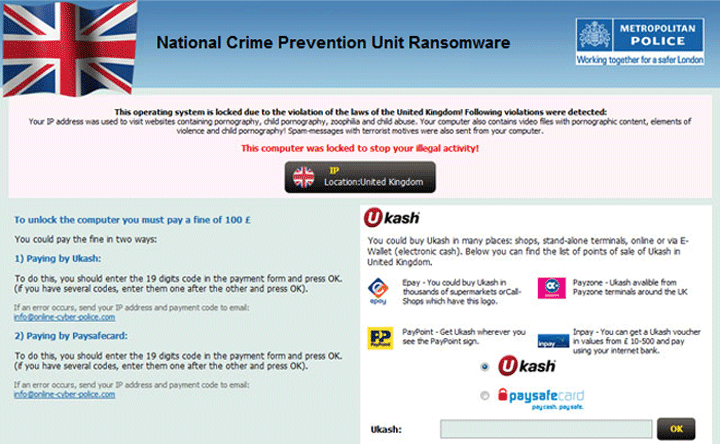'National Crime Prevention Unit' Ransomware
Threat Scorecard
EnigmaSoft Threat Scorecard
EnigmaSoft Threat Scorecards are assessment reports for different malware threats which have been collected and analyzed by our research team. EnigmaSoft Threat Scorecards evaluate and rank threats using several metrics including real-world and potential risk factors, trends, frequency, prevalence, and persistence. EnigmaSoft Threat Scorecards are updated regularly based on our research data and metrics and are useful for a wide range of computer users, from end users seeking solutions to remove malware from their systems to security experts analyzing threats.
EnigmaSoft Threat Scorecards display a variety of useful information, including:
Ranking: The ranking of a particular threat in EnigmaSoft’s Threat Database.
Severity Level: The determined severity level of an object, represented numerically, based on our risk modeling process and research, as explained in our Threat Assessment Criteria.
Infected Computers: The number of confirmed and suspected cases of a particular threat detected on infected computers as reported by SpyHunter.
See also Threat Assessment Criteria.
| Threat Level: | 10 % (Normal) |
| Infected Computers: | 437 |
| First Seen: | July 25, 2013 |
| Last Seen: | May 13, 2023 |
| OS(es) Affected: | Windows |

'National Crime Prevention Unit' Ransomware Image
The ultimate goal of the 'National Crime Prevention Unit' ransomware is to scare you into paying the required fine whose price may vary depending on the version of the program you've been infected with. According to user reports, the most commonly requested fine is €100, but there are cases in which a larger sum has been requested. The 'National Crime Prevention Unit' ransomware usually gives the user the opportunity to choose between two payment methods, Ukash and Paysafecard, both of which aren't used by government agencies anywhere in the world. Right after the payment, you may be asked to enter a unique 19-digit code that will, according to the cyber criminals, unlock your computer and make up for your illegal activities.
Keep in mind that this ransomware has been around for a while, so malware researchers report that there are different versions of it spreading across the web. The lock screens may vary in different countries, as well as you may see different warning messages depending on the version of the 'National Crime Prevention Unit' ransomware you have on your computer.
There is a high chance that the 'National Crime Prevention Unit' ransomware may render most of your computer unusable but you may also be accused of illegal online activity such as:
- Downloading illicit software.
- Visiting potentially corrupted websites.
- Watching prohibited pornography.
- Taking part in illegal gambling games.
These are just some of the messages that the 'National Crime Prevention Unit' ransomware may use to scare you into paying the requested fine. Whatever you do, you must remember that these messages are not real, and you must never pay the money they require! All of the messages you see are just scare tactics that are commonly used by third parties who want to make their threats seem more real and dangerous.
Apparently, the 'National Crime Prevention Unit' ransomware may state that the warnings you see are coming from a major government organization, but, in fact, they are just random accusations crafted by the evil-minded people responsible for this particular ransomware's development. In order to make the case seem real, the cyber criminals may display your IP address, as well as the country you are browsing from. Keep in mind that getting your hands on such information isn't difficult, and the fact that you see your IP address, shouldn't concern you at all.
Why is the 'National Crime Prevention Unit' Ransomware an Apparent Fraud?
Inexperienced computer users may find the messages coming from this threat to look very real, but there are plenty of signs that give away the true purpose of this computer threat. First of all, a government agency or organization will never send such online warnings to users who are accused of illegal online activity. Second of all, these type of fines are never paid online, let alone by using anonymous payment methods such as Ukash and Paysafecard. Last but not least, few government agencies around the world are allowed to monitor the online activity of Internet users, so there is a very slight chance that your browsing habits have been or ever will be spied on by organizations such as the National Crime Prevention Unit.
What should You do if You are Infected with 'National Crime Prevention Unit' Ransomware
The 'National Crime Prevention Unit' ransomware may encrypt some of your files or infect important system files. The threatening code used by this ransomware may also use the Windows Registry to disable important system tools such as the Task Manager, Command Prompt and the Registry Editor. The best course of action is to get the threat removed as soon as possible because the 'National Crime Prevention Unit' ransomware may open security holes in your system and leave you exposed to more threatening applications such as Trojans.
If you are not completely sure how to get rid of this threat, then remember that you must never pay the fine the 'National Crime Prevention Unit' ransomware requests! Even if you make the payment, you may not receive the promised code, and your system will still be locked due to 'illegal online activity', so spare your money and try to remove the threat by yourself, or look for the help of security experts.


Submit Comment
Please DO NOT use this comment system for support or billing questions. For SpyHunter technical support requests, please contact our technical support team directly by opening a customer support ticket via your SpyHunter. For billing issues, please refer to our "Billing Questions or Problems?" page. For general inquiries (complaints, legal, press, marketing, copyright), visit our "Inquiries and Feedback" page.